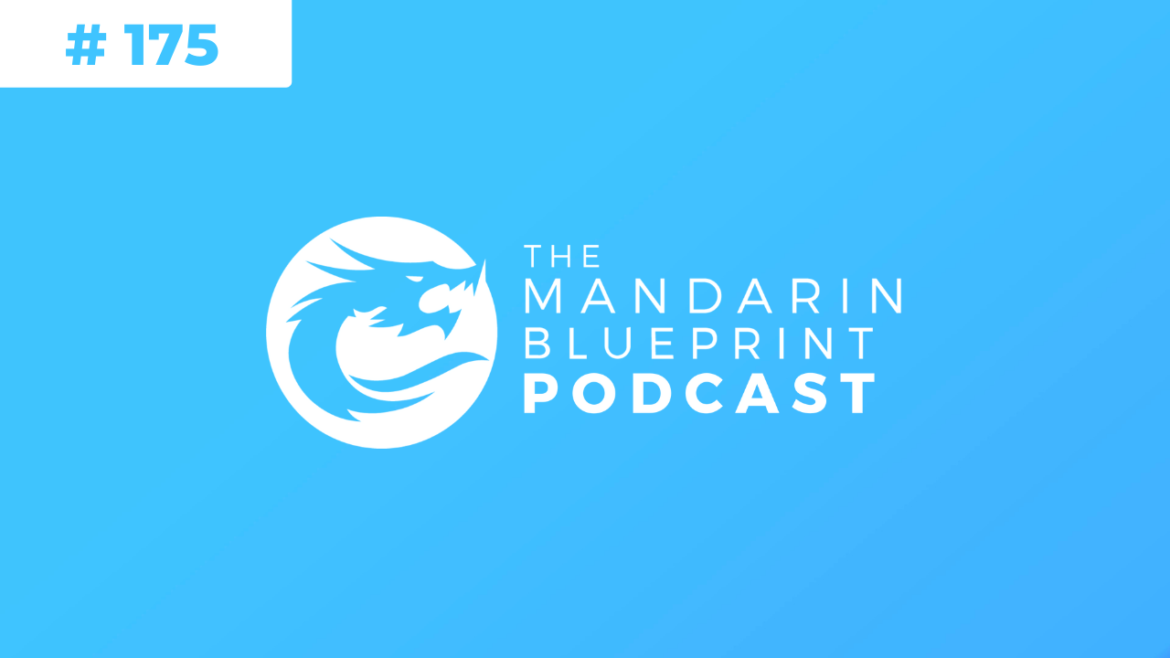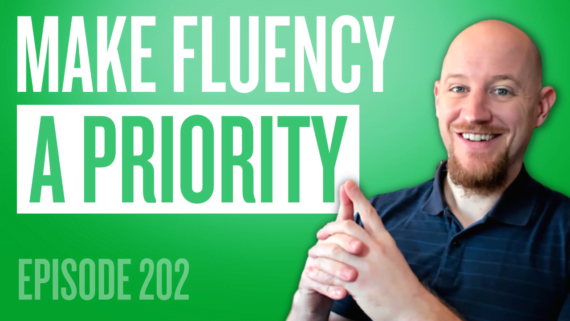
175. Legends of Language Learning
欢迎光临! Welcome!
You can now subscribe to the podcast by the links below, or you can subscribe by copying the following URL into your favorite podcast APP.
The Mandarin Blueprint Podcast focuses primarily on The Blueprint online curriculum. Creators Luke Neale & Phil Crimmins answer questions and comments, discuss topics related to China and Mandarin learning, and have special guests.
Want to learn how to speak fluent Chinese fast? Join our free Webinar right here.
欢迎光临! Welcome!
You can now subscribe to the podcast on iTunes, Stitcher, Spotify, or you can subscribe by copying the following URL into your favorite podcast APP:
https://www.mandarinblueprint.com/feed/podcast/
The Mandarin Blueprint Podcast focuses primarily on The Mandarin Blueprint Method online curriculum. Creators Luke Neale & Phil Crimmins answer questions and comments, discuss topics related to China and Mandarin learning, and have special guests.
0:00 Affiliate Link & Reviews
Become a Mandarin Blueprint Affiliate
Leave us a Google Business Review 🙂
13:16 Comments & Emails
James Rogers by Email
Hey Luke and Phil. Just thought I’d mention this in case you think it might work for other people and is worth sharing. I’ve unlocked every sentence in the intermediate course and it’s been really valuable. I have reached the point through where I’m only getting to learn about 10-15 characters a week if I unlock all the sentences in the upper intermediate course. So I’ve decided to learn 25 characters a day which is fairly easy as they’re so quick to learn now and unlock 30 sentences a day as well. This stops a huge SRS burden which in the past has sucked the joy out of learning, lol. I’ve decided to unlock only the sentences that are needed to learn words I wouldn’t get from compound word characters together…or that aren’t similar concepts. For instance 敏 has quite a few sentences but I’ve only unlocked enough to get a sense of the character’s usage and not all of them. That way I can learn the words that are not obvious first, then it’s my intention to go back and unlock sentences that I feel would still be of value. Hope that makes sense. It’s been something I’ve wrestled with for the whole intermediate course and think this approach allows immersion to fill in the remaining gaps while learning enough to make immersion easier to understand.
I think it’s especially relevant as many characters have quite specific concepts attached and need little time to understand so may need no sentences unlocked whereas something like 调 is a lot of work to get to grips with. I also remove flash cards if I feel they get to the point where I comprehend them above 98%…as in I get nothing from reviewing them.
Thanks for all the work guys. Hope you’re both well, Jimmy.
20:08
Jeff Papendorf by Email
Hi Luke and Phil.
Thanks for putting together the Mandarin Blueprint Method.
I came across you guys when looking for help in understanding the difference between 在 and 着. I have been going through the HSK curriculum and your video on the topic was so much more helpful than the book, my tutor, or anything else I found online.
When I watched more of your videos, I was really impressed with your pronunciation as a non-native speaker. One recommendation I had been given for studying Chinese was to find a “language idol” and work toward trying mimic them. Most everything I can find online was from female speakers and trying to match their tones, especially first tones with a deeper voice, just never sounded right. Well, I found my Chinese language idols in you.
My family moved to Xi’an from Wisconsin (USA), and we have been studying Chinese since the beginning of 2021. We have 4 kids (9th grade, 6th grade, 3rd grade, and kindergarten), and we all trying to learn Chinese. We are all at an international school for foreigners from kindergarten through high school. I started the 2-week trial to work on my pronunciations. I was really surprised by all the other stuff you have in the course. My wife has been going through the 2-week trial with me doing the Hanzi Movie Method. I really appreciate the systematic approach (as an engineer) and my wife loves the various mnemonic techniques (as a teacher). We share our “movies” with our kids during dinner as we share different things we learned in our different Chinese classes. Our kids want to create their own movies.
We are definitely considering subscribing for more time, but we are wondering what options you have for a “family package” so that we can at least all have our own set of flash cards. Do you have any types of “family” or other packages that could help our family go through this together?
Our 2 pain points we have had with the system are: 1.) slow internet speeds in China at night when we are trying to study…it would be nice if we could download the videos so we didn’t waste so much time buffering. 2.) We have to use a VPN to access the Traverse flash cards. The Traverse cards are nice with the images but it would be nice if we didn’t have to use the VPN which slows our internet down even more. And it would be nice to have something that would allow all of our family members to have their own deck of cards with their own SRS scores and own images for actors/props/locations.
Overall, we are really impressed with what you have going here. It’s been refreshing to work through your lessons compared to just going through the HSK textbooks and workbooks. We are hoping that this can help us level up our Chinese skills, so that we can share this with the other 20+ foreigner staff members here struggling to learn the language.
Let us know what kind of options we might have. ?Best regards,
Jeff Papendorf
27:25
珂兰 by Community
大家好!
关于45级故事叫‘小事包含大爱’
麻烦你们帮我一下。‘心里有很多苦的人,要多少甜才能满足呢’
我猜一猜- 意思是。。。。。。 人生有多么苦,要多少甜才让人们满足呢?
心里的人 – 这些字多我来说勾起了-‘我心里在乎的人,家人,朋友,等等’多谢! 故事让人感动啊。
29:07
Ceri Woods on Level 21 Complete
One of the main things I have actually always appreciated about your course is the way you get meanings of things across (including tone), and your inclusion of idioms and cultural context… After all, language is based on collective cultural experience, so learning the words without those things to back it up just doesn’t make sense. Also it’s more interesting!
30:59
Abigail on 汽车,自行车,火车
What does 可是 mean in 这可是一个很好的办法?
32:07
Annika on Word Structure Part 8 of 8 – Affixes 附加式
Is there any difference between 尽头 and 末?
35:17
Jaimee K on Compound Final OU: 走 zǒu,走了 zǒu le,走吧 zǒu ba,我走了 wó zǒu le
I’m curious if you could say ‘wo men zou le’. Possibly in the context of going to a party or running into a friend with your partner and you both are leaving the group. Or would you have to specify who all is leaving?
35:58
Abigail on 电动车 in Context
What does 让 mean in 让她下楼来看我新买的电动车。?
37:07
Gavin Meakin on 多 in Context
Hi Luke and Phil. I’m getting caught up on the 对 in 他对这件事不想多说. How is it operating in this context?
38:45
Gavin Meakin on 以外 in Context
I was stuck on and really overthinking 这儿以外的人都不认识他 and then it just struck me after a few flashcard reviews. 这儿 (here) 以外的人 (apart from people) 都 (all) 不认识他 (don’t know him). Apart from the people here, all don’t know him. I suppose I was getting stuck on the combination of 这儿 and 以外的人 and then what the 都 was referencing, but it seems much clearer now. Take home lesson is do flashcard reviews and trust in the process 😉
40:19
Ted Parker on Nasal Final IANG (YANG): 样 yàng,一样 yíyàng,两个 liǎng ge
I noticed that Hacking Chinese says that “-ang” and “-iang” are pronounced with the same vowel–[ɑ], the “a” in “father”–suggesting that the vowel of “bāng” should be pronounced like that of “yàng.” Wikipedia seems to suggest the same thing: “ang” = [aŋ], “yang” = [jaŋ]. But looking at my IPA vowel chart, it does make sense to me that the front semivowel “y” would pull the back “a”-as-in-“father” more towards to the front “a”-as-in-“car.” I have trouble hearing the difference myself, but I wonder if it’s a matter of degree or of variation among speakers and that’s why there’s this disagreement. (Hacking Chinese link: https://www.hackingchinese.com/a-guide-to-pinyin-traps-and-pitfalls/#22)
43:11
Jaimee K on (BONUS) The Power of Chinese Characters: 用 yòng
With every one of these bonus videos, I fall in love with this language a little more. It’s so amazing seeing words created so logically, instead of this weird melting pot language that is English
Schools don’t even teach you why things are pronounced certain ways. You’re just told to remember weird spellings. In high school I had to explain to my English teacher why fiance(e) was sometimes spelt with two e’s (I had been learning French already and knew that’s where it came from)
It’s easy to say, the further I get in this course, the more heart I want to put into this journey. I already talked to my partner about visiting Cheng Du for our ten year anniversary lol (won’t be until 2030, but hopefully the world will officially be post covid by then)
45:21
Christopher Weeks on Welcome to Pronunciation Mastery! How to Approach the Course
Back here to review pronunciation!
I started it the first time in June 2020 and a few months later became a lifetime member of Mandarin Blueprint. As someone who has reached the end of the Intermediate course, has previewed parts of the Upper Intermediate and Advanced, and completed the Habits Building Course, those who are just beginning, you are in for an interesting journey and the amount of content ahead which wasn’t there two years ago.
The thing which will always let you down if you don’t master it first time though is good pronunciation, even at the higher levels. As someone, who is often complimented for writing beautiful characters, I will still get confused looks as I try to communicate certain words.
This time round, I vow to master -un, -ue, -en, c-, -e -ui and master my tone pairs!
47:23
Brian O’Connor on Pick a Prop 钅
I don’t quite get why there isn’t a separate movie for this character.
In previous similar cases, I get why 月 can be sort of bent out of shape and used in 然, , or even how 犬 with a stretch can become 犭, but 钅seems to have no strokes in common with 金.
So without a movie with props, it’s pretty hard for me to remember the strokes for 钅. Any advice?
49:41
Annette Bicknell on 父亲 in Context
司马光 : Sima Guang or Sī Mǎguāng? When seeing three characters for a name, is the first the last name as suggested in the pinyin translation and the other two the first name? Or are the first two “Sima” the last name?
Any guidelines as to how many of the characters are last and first name? I am under the impression that by far most Chinese family names are one character, but I may be wrong.
52:59
Benjamin ROUCHON on MAKE A MOVIE 叫
Hi,
Luke says that for the room associated with the 4th tone, we can change our mind (between bathroom and backgarden) even at the moment when we bring our actors and interact with props to represent the keyword.
Do you mean that within a specific set (-ao in that case) we can take the most suitable room according to the props and actors we have to build the scene for and change the room when building the scene for another character within the same set ?Lets take an exemple with the 2 following characters jiào and dào :
Jiào could have the backgarden as its associated room and dào the bathroom or do the character dào would have to have the backgarden associated because during the first scene with jiào the backgarden had been chosen ?
Thks


